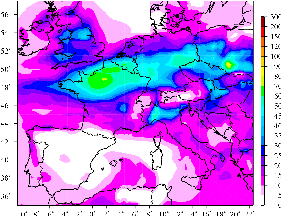Episodes >> PM 10
Examples of particulate
pollution episodes
February 2006
|
The map on the right display the isolines of PM10 peak concentrations
(in µg/m3) calculated by the CHIMERE model for the 1st of February
2006. In this case, the strong concentrations of PM10 observed on the Paris
area have a local origin - as it is showed by the observations, as well as
the composition of the particles simulated by the model. Strong atmospheric stability which prevails during anticyclonic situations limits the dispersion of the atmospheric pollutants and supports their accumulation near large emission centers (cities, industries). |
March 2004
|
On the right-hand side, the maps display the isoconcentrations of
PM10 (in µg/m3) calculated by the CHIMERE model during a wintertime
episode of particulate pollution. This episode last from March 26 to March
31, 2004 (maps refer to the 30th of March 2004, 0 a.m.). They highlight the
largely continental origin of this episode of particulate pollution: the
areas concerned extend on a broad band, from East Germany to Cotentin.
All the North of France is touched. Such winter episodes of particulate pollution are often associated to anticyclonic systems localised on Scandinavia or the North Sea. The conditions of strong atmospheric stability as well as the light flow of the North-East which prevails over Europe in these situations limit the dispersion of the atmospheric pollutants and support their transport from areas of strong emissions (cities, industries) towards places remote from large emission centers. |
References 
Bessagnet, B., Hodzic, A., Blanchard, O., Lattuati, M., Le Bihan, O., Marfaing, H. et L. Rouïl, Origin of particulate matter pollution episodes in wintertime over the Paris Basin, Atmospheric Environment, Volume 39, Issue 33, October 2005 , pages 6159-6174
in PREV'AIRAir Quality forecasts in
the PREV'AIR SystemAnalysed MapsVerification Available observation dataInput Data to the PREV'AIR SystemRequest for the Provision of Air
Quality Numerical Simulation DataLe programme CarpateDétail de la PrévisionChronogramme Nitrogen dioxide Forecast Ozone ForecastAOT MODEL - AOT SATELLITES PM 2.5 Forecast PM 10 ForecastForecast Desert dust Analysed Ozone mapsAnalysed PM 10 maps Ozone Observation Nitrogen dioxide Observation PM 2.5 Observation PM 10 ObservationVerification of the Ozone forecastsVerification of the Nitrogen dioxide
forecastsVerification of the PM 10 forecastsBilan Annuel : GénéralitésDépassement de seuils en heuresDépassement de seuils en jourAOTsMoyenne des picsStatistiques O3Statistiques no2Examples of photochemical
pollution episodesExamples of particulate
pollution episodesAvertissementLiencontactThe partners in PREV'AIR








